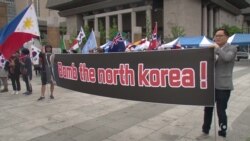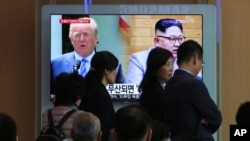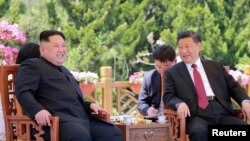North Korea’s recent threat to pull out of the upcoming nuclear summit with the U.S. has added new urgency to South Korean President Moon Jae-in’s visit to Washington next Tuesday.
President Moon has played a key role in facilitating the meeting between North Korean leader Kim Jong Un and U.S. President Donald Trump scheduled to be held in Singapore June 12.
Diplomatic jeopardy
At the recent inter-Korean summit Moon got Kim to affirm a broad commitment to rid the Korean Peninsula of nuclear weapons and that opened the door for Trump and Kim to negotiate a more detailed agreement to end North Korea’s nuclear program.
However, uncompromising positions recently voiced by U.S. National Security Adviser John Bolton demanding the North’s unilateral disarmament, and by North Korea in response canceling further talks with the South and threatening to pull out of the U.S.-North Korea summit, have put the prospects for continued diplomatic progress in jeopardy.
President Trump has tried to reassure the North Korean leadership that a nuclear deal would not weaken the Kim government, but would bolster it.
“He'd be in his country, he'd be running his country. His country would be very rich.” Trump said Thursday while meeting with NATO Secretary General Jens Stoltenberg in the White House.
Moon mediation
President Moon, who will meet with Trump in Washington on Tuesday, has said he will try to moderate differences between the U.S. and North Korea over how to achieve denuclearization, while also giving the Kim government the security guarantees and sanctions relief it wants.
But the convergence of interests that have brought Moon, Trump and Kim to all agree to give diplomacy a chance seems to be diverging over how to bridge the gap between the U.S. demand for complete denuclearization prior to offering any concessions, and the North’s insistence on a step by step process that would ease sanctions early on for incremental measures, such as giving up some nuclear material and allowing in outside inspectors.
“We have three leaders, each thinks he is in the driver’s seat and it is like three cars hurling toward an intersection. Each one convinced he has the right of way and the other two drivers will yield,” said Bruce Klingner, a senior research fellow with The Heritage Foundation's Asian Studies Center while speaking at the Asian Leadership Conference in Seoul this week.
Trump and Kim’s unconventional approach to diplomacy, by rushing to meet before a deal is worked out, also runs the risk of being undermined by hardline elements in their governments.
“I think there are questions in both Pyongyang and Washington about how the leaders are connected to their own bureaucracies.Maybe we are seeing evidence of that question even today,” said Scott Snyder, the director of the U.S.-Korea policy program at the Council on Foreign Relations, who was also in Seoul for the security-related leadership conference.
There are also concerns that China may have encouraged North Korea to take a more gradual approach to denuclearization by promising to ease sanctions no matter the outcome of the summit.
Inter-Korean friction
Pyongyang has also taken on a harsher tone with Seoul this week, with a high level negotiator calling the South Korean government "ignorant and incompetent," denouncing U.S.-South Korean military drills underway, and threatening to halt all inter-Korean talks.
Some South Korean conservatives staged a rally on Friday in front of the U.S. Embassy in Seoul to protest President Moon’s efforts to pursue a peace deal with a North Korea government they say cannot be trusted.
“They only talked very vaguely about the denuclearization of the Korean peninsula. What concerns me the most is the lack of transparency between Kim Jong Un and President Moon,” said Byun Hee-jae, a rally organizer with a conservative organization in Seoul called Media Watch.
However, the vast majority of South Koreans support Moon’s persistent diplomatic efforts to facilitate denuclearization talks and improve relations with the North.








